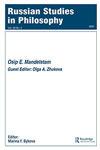从“科学主义”1到文化逻辑
IF 0.1
4区 哲学
Q4 Arts and Humanities
引用次数: 0
摘要
现代逻辑概念——本质、现象、因果关系等等——与中世纪的概念接壤,包括人的概念,以及最终的上帝对实物的参与。根据Bibler的说法,每一种逻辑都是媒介逻辑(两种或两种以上的逻辑),但这一点直到20世纪末才得以实现,这要归功于米哈伊尔·巴赫金的作品,这些作品展示了艺术品的对话性及其在文化中的不可扬弃性。索福克勒斯的作品在莎士比亚时代没有失去意义,在托尔斯泰时代也没有失去意义:他们的人物永生,他们的思想在与其他人物的思想的辩论/对话中得到再现。Bibler同样假设一种新逻辑的形成是一种文化逻辑,不同于黑格尔的单逻辑科学逻辑。在这里,Bibler将现代逻辑定义为以科学为导向的——也就是说,作为一种科学学说——他描述了将其转变为文化逻辑的必要性,提供了一个悖论的定义,即一种情况的完全展开导致其自身的毁灭。本文章由计算机程序翻译,如有差异,请以英文原文为准。
From the “Doctrine of Science”1 to the Logic of Culture
ABSTRACT Modern logical concepts—essences, phenomena, causality, and so forth—border on medieval concepts, including the concept of man’s and, ultimately, God’s involvement in real objects. According to Bibler, every logic is dia-logic (two or more logics), but this is only realized in the late twentieth century thanks to, among others, the works of Mikhail Bakhtin, which demonstrated the dialogic nature of artworks and their non-sublatability in culture. The works of Sophocles do not lose their significance in Shakespeare’s time, nor do Shakespeare’s during Tolstoy’s time: Their characters live forever, and their ideas are reproduced in debate/dialogue with other characters’ ideas. Bibler similarly postulated the formation of a new logic as a logic of culture that differed from the Hegelian mono-logical logic of science. Here, Bibler defines modern-era logic as science oriented—that is, as a doctrine of science—and he describes the need for transforming it into a logic of culture, providing a definition of paradox where the complete unfolding of a situation leads to its own destruction.
求助全文
通过发布文献求助,成功后即可免费获取论文全文。
去求助
来源期刊

RUSSIAN STUDIES IN PHILOSOPHY
PHILOSOPHY-
CiteScore
0.10
自引率
0.00%
发文量
14
期刊介绍:
Russian Studies in Philosophy publishes thematic issues featuring selected scholarly papers from conferences and joint research projects as well as from the leading Russian-language journals in philosophy. Thematic coverage ranges over significant theoretical topics as well as topics in the history of philosophy, both European and Russian, including issues focused on institutions, schools, and figures such as Bakhtin, Fedorov, Leontev, Losev, Rozanov, Solovev, and Zinovev.
 求助内容:
求助内容: 应助结果提醒方式:
应助结果提醒方式:


